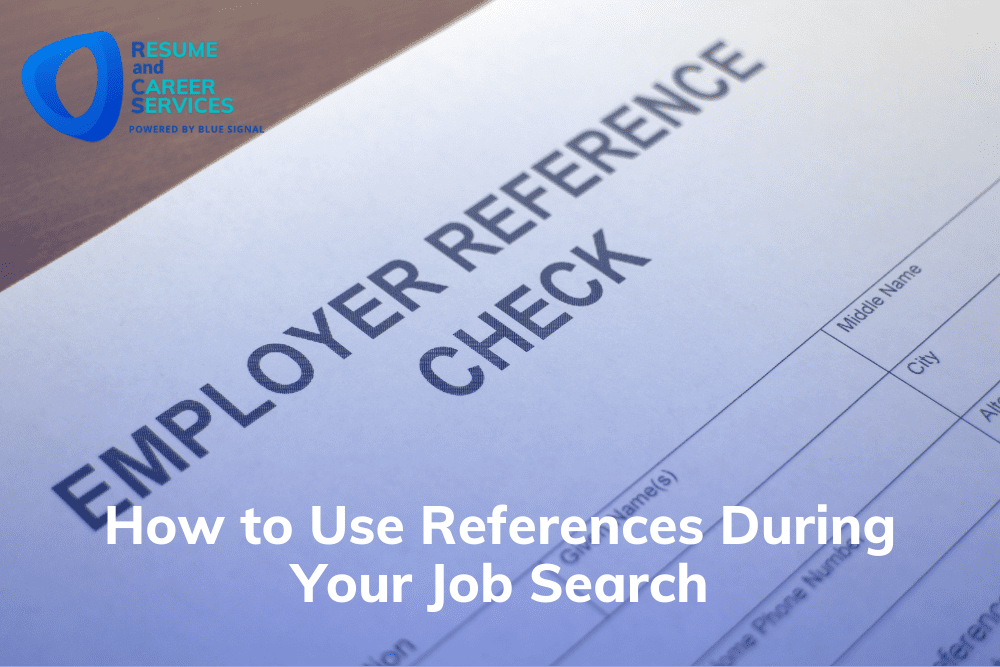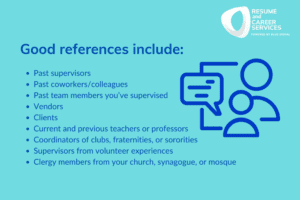How to Use References During Your Job Search

As you embark on a job search, there are many components to consider. First, you create your personal brand, which is followed by writing all the documents needed to support that brand. Those will include your resume and LinkedIn profile for sure but may also extend to a portfolio and website. You’ll also need a cover letter and thank-you letter. In all this, what can get lost is knowing where and how to use references.
References are an integral part of a successful job search. In addition to you sharing your value proposition and how amazing you are, third-party testimonials can speak volumes—and are sometimes even more believable—beyond what you share in your resume and other documents. Let’s cover how to secure great references and how to use references in a successful job search.
Who Are Good References?
 Before you know how to use references, you need to determine who will be the best references for you. Ideally, you’ll have three to five people, and these will be people who know you well. It’s usually best to avoid asking current coworkers or supervisors since most job seekers don’t want to alert their company that they’re in a job search. Instead, consider asking:
Before you know how to use references, you need to determine who will be the best references for you. Ideally, you’ll have three to five people, and these will be people who know you well. It’s usually best to avoid asking current coworkers or supervisors since most job seekers don’t want to alert their company that they’re in a job search. Instead, consider asking:
- Past supervisors
- Past coworkers/colleagues
- Past team members you’ve supervised
- Vendors
- Clients
If you are new to the world of work (aka, a recent high school or college graduate) and don’t have a lot of professional experience to tap into for a reference, expand your search a little bit to include:
- Current and previous teachers or professors
- Coordinators of clubs, fraternities, or sororities
- Supervisors from volunteer experiences
- Clergy members from your church, synagogue, or mosque
In every instance, the references you do not want to use are relatives and significant others. There’s always someone to ask other than a parent, sibling, girlfriend/boyfriend, or spouse, even if that means getting creative. The person you think of last may be the perfect reference for you!
Ask Your References Before Volunteering Them
Employers and recruiters often call on references who are unprepared, which makes for an awkward encounter on both sides of the conversation. Always ask your references for permission before sharing their names with potential employers. You may want to share a copy of your resume with them so they’re up to date on what you’ve done and the direction you’re headed. It’s imperative that you ask people who will be good references. This is another issue that some job seekers have had when they haven’t asked for permission. You must know that your reference is going to say wonderful things about you.
Asking your references to act as a reference is just the start, though. Let them know where you’ve interviewed and who might be reaching out to them to ask for their feedback. This gives your references ample time to prepare for a reference check and be ready to say the things that will move you forward in your job search.
Definitely thank your references: when you ask them, when you let them know someone will be calling, and after your potential employer contacts them. Gratitude can go a very long way to securing a glowing reference.
When to Share Your References
There was a time when resumes would end with “references available upon request.” That is no longer the case and hasn’t been for a while. Employers know you will provide references, so you don’t need to tell them that on your resume.
Likewise, you shouldn’t add references directly to your resume itself. ATS systems won’t know where to put them anyway, and it’s unlikely an employer will call your references without meeting you first.
Instead, create a separate list of references that you can share when it’s requested. Copy the same header that’s on your resume, so you have your contact information there and your presentations look branded. Label this new document “Professional References” (this replaces the header/title on your resume). Then create a list of your three to five people. For each of them, include:
- Name
- Phone number
- Email address
- How you know them
It will read like this:
John Smith
480-555-1234
johnsmith@gmail.com
Supervisor at ABC Company.
How to Use References During Your Job Search
There are times when you will be asked for references at the time you apply for a position. If that’s the case, you’ll usually enter those names into an online application (ATS system) to be added to your information. But that’s not the most common time to share your references.
The best way of how to use references in your job search is during the interview process. Save them as your opportunity to end your in-person interview. As you’re getting ready to say goodbye and leave, pull out your reference sheet and say:
“It’s been a pleasure meeting with you today, and I am super excited about this opportunity! I’m going to leave you with my list of references. Everyone on this sheet knows I’m here today, and they’re ready to take your call. I look forward to the next steps!”
If you are meeting virtually, this approach will still work. Instead of handing over a sheet of references, however, you’ll email it to them. That means your script will change slightly:
“It’s been a pleasure meeting with you today, and I am super excited about this opportunity! I’m going to follow up with you after our meeting and email you my list of references. All of them know we’re speaking today, and they’re ready to take your call. I look forward to the next steps!”
This is an ideal way to close an interview and let the hiring committee know that you’re enthusiastic, prepared, and ready to move forward.
Consider LinkedIn Recommendations as Well
As you’re gathering and preparing your reference list for the interview process, another way to incorporate them into your personal brand is on your LinkedIn profile. LinkedIn has a place for recommendations right on your profile, and you can ask people in your network to say something nice about you there.
You can only receive recommendations from first-level connections, and you cannot write the recommendation yourself (unless you write it and send it for another person to post). LinkedIn’s help page provides the information you’ll need to request a recommendation. Only three recommendations show on your profile, but you can request as many as you’d like. Think of a LinkedIn recommendation as a newer version of paper letters of recommendation. The benefits are that online testimonials stay on your profile, and you don’t have to worry about making copies to send out with your resume.
How to Use References Is Just Part of the Job Search
Sure, you need to incorporate how to use references into your job search, but there’s a lot more to consider. In addition to writing your resume, LinkedIn profile, and cover letter, the team at Resume and Career Services is here to provide coaching on everything you need to know along the way, including getting together and using references.
Learn more about how we can help you elevate your search and shorten the time needed to land your next opportunity!
